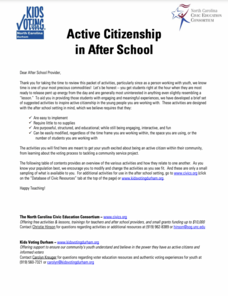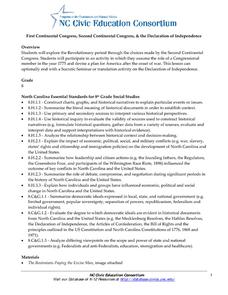Overcoming Obstacles
Giving Presentations
With their action plans in place, groups now develop a presentation to get others interested in their project. Scholars learn how to present themselves during a presentation and elaborate on and add visuals to their presentation. After...
Overcoming Obstacles
Formalizing and Finalizing the Action Plan
It's time to get to work! Groups assign roles, duties, and due dates for their Service Learning action plan. They then identify the approvals they will need to complete their project successfully.
Overcoming Obstacles
Gathering Information and Making the Commitment
Scholars create and commit to a contract for their Service Learning project. The contract details who is responsible for which tasks on the action plan they developed in a previous instructional activity.
Overcoming Obstacles
Designing an Action Plan
Outcome + available resources + schedule + timeline + steps to complete project = Action Plan! The second lesson in the "Service Learning" module outlines for scholars the steps to take when designing an action plan for their Service...
Overcoming Obstacles
Introduction to Service Learning
Introduce scholars to Service Learning with a lesson that distinguishes between Service Learning and Community Service. After reading about others involved in Service Learning, class members generate a list of issues in their communities...
Overcoming Obstacles
Playing by the Rules
The takeaway from the "Playing by the Rules" lesson is that it is each person's responsibility to learn the rules in a given situation and that they must accept the consequences if they choose not to follow the stated rules. Class...
K20 LEARN
But What About Me?: Teaching Perspective In The Social Studies Classroom
How would the story of the discovery of America be different if indigenous people told it through their eyes? Individuals compare the conventional account of this moment in history to an account given by one of the native peoples. After...
Facing History and Ourselves
Community Is... Community Isn't
Scholars continue their exploration of the concept of community by first completing an anticipation guide and then engaging in a Four Corners activity to share their responses. They analyze an essay in which the author defines community...
Facing History and Ourselves
Making Meaning of Community
In the post-pandemic classroom, it's more important than ever to begin the school year by building a strong sense of trust and community. Using the Make Meaning and Big Paper teaching techniques, groups develop a definition of community...
Facing History and Ourselves
Our Names and Our Place in the World
Names come with all sorts of nuances and can influence how we see ourselves and how others see us. To gain insight into the power of names, class members journal about their names and then read a short essay about a girl and her feelings...
Facing History and Ourselves
Dual Identities
Many of us have multiple identities. There's who we are at home, school, friends, and strangers. And often these identities come with different names. The third activity in the First Days of School series examines how names reflect...
Facing History and Ourselves
What's In a Name?
Rumpelstiltskin understood the power of names. The second lesson in the First Days of School series focuses on building community by recognizing the importance of the relationships among names, identities, and cultures. Learners engage...
Carolina K-12
Active Citizenship in After School
Active citizenship is the bedrock of any great democracy. Continue the trend by teaching the next generation about voting rights and the functions of elections in society. The variety of activities in the resource includes a human...
Carolina K-12
African American Troops in the Civil War
Middle schoolers explore the history of the African-American troops that served during the American Civil War. After reading primary source documents that detail the controversies about permitting freemen and former slaves to serve,...
Carolina K-12
First Continental Congress, Second Continental Congress, and the Declaration of Independence
Your learners will take on the roles of Congressional members in the year 1775 and devise a plan for America after the onset of the Revolutionary War.
Carolina K-12
Revolutionary War Era Tick-Tack- Toe
So many fantastic activities on the American Revolution! From drawing political cartoons illustrating events of the Boston Massacre to writing a diary entry as a shopkeeper during the Boston Tea Party, your young historians will...
Carolina K-12
Constitutional Period Parade
What a unique and creative way for class members to summarize what they have learned about the United States Constitution! Here you will find project guidelines for learners to work independently on designing a float to represent a topic...
A&E Television
Documenting Democracy: Lesson Plans on the United States Constitution
Balance and compromise. Class members come to understand the importance of these concepts as they investigate the concerns of the various stakeholders and how the format of the Constitution addressed these concerns.
PBS
Reading Adventure Pack: Government
A reading adventure pack looks closely at government with the help of two books—one fiction, one nonfiction, and a series of activities. Learners craft a mobile to visualize a balanced government, participate in a scavenger hunt around...
Facing History and Ourselves
Identity Charts
Many factors shape the identity of persons, communities, and even nations. Tweens and teens have an opportunity to consider the many aspects of identity as they create a graphic that reflects who they are. Class members first brainstorm...
Facing History and Ourselves
Bio-poem: Connecting Identity and Poetry
Writing a bio-poem is a great way to have young scholars go below the surface and reflect on who or what has made them who they are. Check out this richly detailed lesson that provides step-by-step directions for crafting a bio-poem.
Albert Shanker Institute
Who Was Bayard Rustin?
Who was Bayard Rustin? Pupils analyze a series of primary source documents to learn about this important figure in the civil rights movement. The lesson contains a short film to watch along with guiding questions and other resources...
Albert Shanker Institute
The March on Washington Logistics Then and Now
I have a dream ... that all pupils will be able to organize a march of their own after learning about how Bayard Rustin organized the 1963 March on Washington for civil rights. Young reformers work collaboratively examining informational...
Miama-Dade County Public Schools
African Americans and the Civil War
The American Civil War is the theme of this packet of materials prepared for Black History Month. Class members learn about the roles that African Americans played during the Civil War and examine the African-American experience after...

























